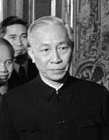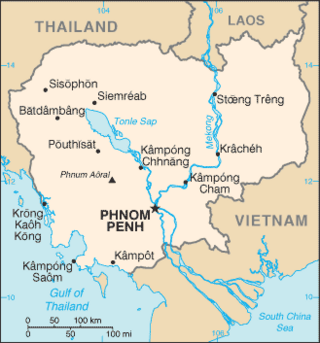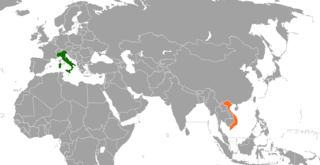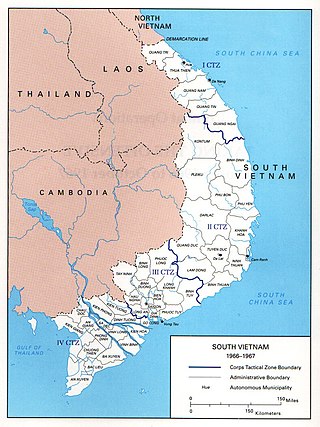Related Research Articles

Hồ Chí Minh, colloquially known as Uncle Ho or just Uncle, and by other aliases and sobriquets, was a Vietnamese communist revolutionary, nationalist, and politician. He served as prime minister of the Democratic Republic of Vietnam from 1945 to 1955 and as president from 1945 until his death in 1969. Ideologically a Marxist–Leninist, he was the Chairman and First Secretary of the Workers' Party of Vietnam, the predecessor of the current Communist Party of Vietnam.

The Viet Cong was an epithet and umbrella term to refer to the communist-driven armed movement and united front organization in South Vietnam. Formally organized as and led by the National Liberation Front of South Vietnam and nominally conducted military operations under the name of the Liberation Army of South Vietnam (LASV), the movement fought under the direction of North Vietnam against the South Vietnamese and United States governments during the Vietnam War. The organization had both guerrilla and regular army units, as well as a network of cadres who organized and mobilized peasants in the territory the Viet Cong controlled. During the war, communist fighters and some anti-war activists claimed that the Viet Cong was an insurgency indigenous to the South that represented the legitimate rights of people in South Vietnam, while the U.S. and South Vietnamese governments portrayed the group as a tool of North Vietnam. It was later conceded by the modern Vietnamese communist leadership that the movement was actually under the North Vietnamese political and military leadership, aiming to unify Vietnam under a single banner.

Lê Đức Thọ, born Phan Đình Khải in Nam Dinh Province, was a Vietnamese revolutionary general, diplomat, and politician. He was the first Asian to be awarded the Nobel Peace Prize, jointly with United States Secretary of State Henry Kissinger in 1973, but refused the award.

David Dean Rusk was the United States secretary of state from 1961 to 1969 under presidents John F. Kennedy and Lyndon B. Johnson, the second-longest serving Secretary of State after Cordell Hull from the Franklin Roosevelt administration. He had been a high government official in the 1940s and early 1950s, as well as the head of a leading foundation. He is cited as one of the two officers responsible for dividing the two Koreas at the 38th parallel.

Melvin Robert Laird Jr. was an American politician, writer and statesman. He was a U.S. congressman from Wisconsin from 1953 to 1969 before serving as Secretary of Defense from 1969 to 1973 under President Richard Nixon. Laird was instrumental in forming the administration's policy of withdrawing U.S. soldiers from the Vietnam War; he coined the expression "Vietnamization," referring to the process of transferring more responsibility for combat to the South Vietnamese forces. First elected in 1952, Laird was the last living Representative elected to the 83rd Congress at the time of his death.

The Tet Offensive was a major escalation and one of the largest military campaigns of the Vietnam War. The Viet Cong (VC) and North Vietnamese People's Army of Vietnam (PAVN) launched a surprise attack on 30 January 1968 against the forces of the South Vietnamese Army of the Republic of Vietnam (ARVN), the United States Armed Forces and their allies. It was a campaign of surprise attacks against military and civilian command and control centers throughout South Vietnam. The name is the truncated version of the Lunar New Year festival name in Vietnamese, Tết Nguyên Đán, with the offense chosen during a holiday period as most ARVN personnel were on leave. The purpose of the wide-scale offensive by the Hanoi Politburo was to trigger political instability in a belief that mass armed assault on urban centers would trigger defections and rebellions.
Cornelius Mahoney Sheehan was an American journalist. As a reporter for The New York Times in 1971, Sheehan obtained the classified Pentagon Papers from Daniel Ellsberg. His series of articles revealed a secret United States Department of Defense history of the Vietnam War and led to a U.S. Supreme Court case, New York Times Co. v. United States, 403 U.S. 713 (1971), which invalidated the United States government's use of a restraining order to halt publication.

Vietnamization was a policy of the Richard Nixon administration to end U.S. involvement in the Vietnam War through a program to "expand, equip, and train South Vietnamese forces and assign to them an ever-increasing combat role, at the same time steadily reducing the number of U.S. combat troops". Brought on by the Viet Cong's Tet Offensive, the policy referred to U.S. combat troops specifically in the ground combat role, but did not reject combat by the U.S. Air Force, as well as the support to South Vietnam, consistent with the policies of U.S. foreign military assistance organizations. U.S. citizens' mistrust of their government that had begun after the offensive worsened with the release of news about U.S. soldiers massacring civilians at My Lai (1968), the invasion of Cambodia (1970), and the leaking of the Pentagon Papers (1971).

The Paris Peace Accords, officially the Agreement on Ending the War and Restoring Peace in Viet Nam, was a peace agreement signed on January 27, 1973, to establish peace in Vietnam and end the Vietnam War. The agreement was signed by the governments of the Democratic Republic of Vietnam ; the Republic of Vietnam ; the United States; and the Provisional Revolutionary Government of the Republic of South Vietnam (PRG), which represented South Vietnamese communists. US ground forces had begun to withdraw from Vietnam in 1969, and had suffered from deteriorating morale during the withdrawal. By the beginning of 1972 those that remained had very little involvement in combat. The last American infantry battalions withdrew in August 1972. Most air and naval forces, and most advisers, also were gone from South Vietnam by that time, though air and naval forces not based in South Vietnam were still playing a large role in the war. The Paris Agreement removed the remaining US forces. Direct U.S. military intervention was ended, and fighting between the three remaining powers temporarily stopped for less than a day. The agreement was not ratified by the U.S. Senate.

The Sihanouk Trail was a logistical supply system in Cambodia used by the People's Army of Vietnam (PAVN) and its Viet Cong (VC) guerrillas during the Vietnam War (1960–1975). Between 1966 and 1970, this system operated in the same manner and served the same purposes as the much better known Ho Chi Minh trail which ran through the southeastern portion of the Kingdom of Laos. The name is of American derivation, since the North Vietnamese considered the system integral to the supply route mentioned above. U.S. attempts to interdict this system began in 1969.

The role of the media in the perception of the Vietnam War has been widely noted. Intense levels of graphic news coverage correlated with dramatic shifts of public opinion regarding the conflict, and there is controversy over what effect journalism had on support or opposition to the war, as well as the decisions that policymakers made in response.

The reaction to the 1963 South Vietnamese coup that saw the arrest and assassination of Ngô Đình Diệm was mixed.
Operation Giant Lance was a secret U.S. nuclear alert operation by the United States that the Strategic Air Command carried out in late October 1969. Giant Lance was one component of a multi-pronged military exercise, the Joint Chiefs of Staff Readiness Test that the Joint Chiefs developed and carried out during October 1969 in response to White House orders. On October 10, 1969, on the advice of National Security Advisor Henry Kissinger, U.S. President Richard Nixon issued the order for the readiness test that led to Giant Lance.

Bilateral relations between Italy and Vietnam are considered to be relatively strong and friendly. Italy maintains an embassy in Hanoi. Vietnam maintains an embassy in Rome.

1973 in the Vietnam War began with a peace agreement, the Paris Peace Accords, signed by the United States and South Vietnam on one side of the Vietnam War and communist North Vietnam and the insurgent Viet Cong on the other. Although honored in some respects, the peace agreement was violated by both North and South Vietnam as the struggle for power and control of territory in South Vietnam continued. North Vietnam released all American prisoners of war and the United States completed its military withdrawal from South Vietnam.

The defeat of the South Vietnamese Army of the Republic of Vietnam (ARVN) in a battle in January set off a furious debate in the United States on the progress being made in the war against the Viet Cong (VC) in South Vietnam. Assessments of the war flowing into the higher levels of the U.S. government in Washington, D.C. were wildly inconsistent, some citing an early victory over the VC, others a rapidly deteriorating military situation. Some senior U.S. military officers and White House officials were optimistic; civilians of the Department of State and the Central Intelligence Agency (CIA), junior military officers, and the media were decidedly less so. Near the end of the year, U.S. leaders became more pessimistic about progress in the war.

Poland–Vietnam relations are the current and historical relations between Poland and Vietnam. Poland has an embassy in Hanoi and Vietnam has an embassy in Warsaw.

Janusz Lewandowski was a Polish diplomat, known for arranging the Operation Marigold, a failed secret attempt to reach a compromise solution to the Vietnam War.
Mieczysław Maneli was a Polish lawyer, diplomat and academic best remembered for his work with the International Control Commission (ICC) during the Vietnam War, especially the 1963 "Maneli Affair". During the Holocaust, he survived the Auschwitz death camp, and then became after the war a prominent academic in Poland, serving as the Dean of Law at University of Warsaw.

American diplomat Henry Kissinger (1923–2023) played an important and controversial role in the Vietnam War. Starting out as a supporter, Kissinger came to see it as a drag on American power. In 1968, Kissinger leaked information about the status of the peace talks in Paris to the Nixon campaign and was rewarded with being appointed National Security Advisor under Richard Nixon. As National Security Advisor, Kissinger sought initially to find a way to end the war on American terms. During his tenure, Kissinger came to differ with Nixon as Kissinger was more in favor of seeking an end to war as expeditiously as possible with minimum damage to American prestige. In October 1972, Kissinger reached a draft agreement that Nixon at first rejected, leading to the Christmas bombings of December 1972. The agreement that Kissinger signed in January 1973—which led to the American withdrawal from Vietnam in March of that year—was very similar to the draft agreement rejected the previous year. As National Security Advisor and Secretary of State, Kissinger favored continued American support for South Vietnam right until the collapse of that state in April 1975, which Kissinger blamed on Congress.
References
- ↑ James G. Hershberg, "Marigold: The Lost Chance for Peace in Vietnam ", 2012, ISBN 978-0-804-77884-8
- 1 2 Wallace J. Thies, "When governments collide: coercion and diplomacy in the Vietnam conflict, 1964-1968", 1980, ISBN 0520039629,
- 1 2 "Cracking a Vietnam War Mystery", National Security Archive Electronic Briefing Book No. 369, Posted - January 15, 2012, (viewed March 13, 2012), around Hershberg's book
- ↑ Hershberg, "Marigold: The Lost Chance for Peace"; Mario Sica, Marigold non fiorì; Florence, 1991
- ↑ For a sanitized version see George C. Herring, ed., The Secret Diplomacy of the Vietnam War: The Negotiating Volumes of the Pentagon Papers"; Austin, TX: University of Texas Press, 1983.